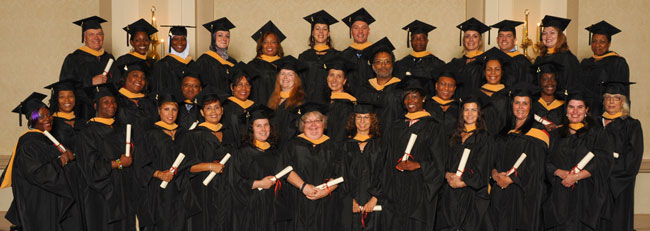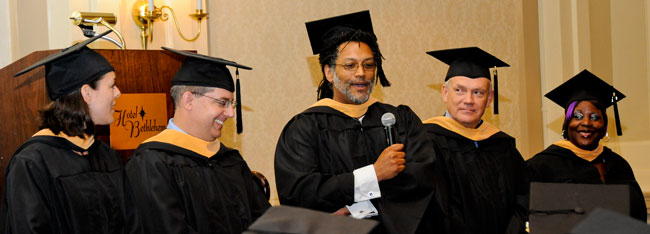 The fourth class of master’s degree recipients of the IIRP Graduate School.“In doing so,” said IIRP president Ted Wachtel in his welcoming remarks, “the Commission affirmed the quality of all of the degrees of all of the students who gambled their time and effort on a new institution and a new field of study that has the goal of positively influencing human behavior and strengthening civil society throughout the world.”
The fourth class of master’s degree recipients of the IIRP Graduate School.“In doing so,” said IIRP president Ted Wachtel in his welcoming remarks, “the Commission affirmed the quality of all of the degrees of all of the students who gambled their time and effort on a new institution and a new field of study that has the goal of positively influencing human behavior and strengthening civil society throughout the world.”
“Not only did the Middle States Commission accredit the IIRP Graduate School,” he continued, “it also proclaimed to the world that restorative practices is a field worthy of study at the highest level. This group of students is about to become graduates of the first accredited higher-education institution in the world that is wholly dedicated to restorative practices.”
Wachtel thanked the audience for their patience and support while their loved ones earned their master’s degrees. He then explained what all the hard work had been about, in an “elevator speech” (one that can be said in the length of an elevator ride) on the IIRP and restorative practices: “Our schools and communities are plagued by bullying, violence and disrespect among young people. The IIRP is the leading organization in the world that is reliably making schools and communities safer. Restorative practices is a way to hold people accountable in a participatory way that is effective in changing behavior.”
However, he continued, all IIRP students know that restorative practices is much more than that. “It has implications for parents, teachers, administrators and leaders of all kinds. It is based on the fundamental premise that people are happier, more cooperative and productive and more likely to make positive changes when those in authority do things with them, rather than to them or for them. It is a philosophy, a way of looking at the world, a way of life.”
Wachtel and IIRP vice president for academic affairs Patrick McDonough then proceeded with the all-important conferral of degrees: the Master of Restorative Practices and Education, to Beth Ann Alosi, Surayya Hava Catovic, Thomas S. Fertal, Kristen R. Jenkins, Maria Marissa Johnson, Tamala Zeretta Layne, Debra Lynn Maskiell, Kristan Orlando, Laura Elizabeth Tierno Peterka and Alberto J. Romero; and the Master of Restorative Practices and Youth Counseling, to Rahman B. Beckwith, Joseph J. Chikkala, Lisa L. Cofield, Joseph B. Devlin, Sherran Rose Marie Grey, Gabrielle Michelle Grieco, Lori Ellen Harris, Judith C. Holliday-Grannum, Rebecca Joy James, Brooke Kelly, Michael Clifford Kenney, Linda Marie Marcucci, Gail Stephanie Miles, Juanita Morales, Kameelah Marwa Mu’Min, Daniel A. Paygar, Sonia Santiago, Donna Biggs Sayegh, Sandra Denise Shields Shelley, Erin Kay Stokes, Mary Janean Sylvester, Marcia Rose Tucker, Marsha A. Walker, Linda Lee Yonkin and Jo Ann Lillian Young.
In the spirit of restorative practices — doing things with, rather than to or for — the ceremony continued with a demonstration of a “restorative circle,” in which one person speaks at a time, sharing their views on a chosen topic. Ten graduates had volunteered to speak, and each addressed the question, “What was most important for you about your IIRP master’s program experience, personally and professionally?”
Here are some excerpts of their answers:
 Alberto Romero takes his turn in the “talking circle,” as Beth Alosi, Tom Fertal, Mike Kenney and Gail Miles look on.
Alberto Romero takes his turn in the “talking circle,” as Beth Alosi, Tom Fertal, Mike Kenney and Gail Miles look on.
Joseph Chikkala, a chemistry teacher at Sayer High School in Philadelphia, Pa., said that IIRP courses had really helped him to grow professionally, teaching him how to help his students deal with their emotions, their spiritual being and their well-being in the classroom. “I have a vision for the students,” he said. “Restorative practices, which is based on separating the deed from the doer, will take me to a higher level with my students and help them to be successful in the future.” Personally, he added, “Restorative practices have helped me to be a better leader.”
Daniel Paygar, from Liberia, in West Africa, who has worked as therapeutic staff support in Philadelphia schools, said that the opportunity to take courses in restorative practices changed his life. “Empowering children and youth to make positive changes in their behavior has been a real pleasure for me. I hope the IIRP will continue to provide opportunities for more international students, especially from West Africa, which will let them come here and receive training in restorative practices, then go back home and help children change their behavior.” Very soon, he said, he will go back home, where he wants to work with children and “help to build a restorative community in my country.”
Thomas Fertal, principal of Lancaster Catholic High School, in Lancaster, Pa., said he came to the IIRP as a newly-appointed vice principal, looking for a better way to effect discipline. He did find that better way, he said, then added, “I leave the Institute as the principal of that same building, and I truly give much of that credit to what I’ve learned in my experience at the IIRP, … [to] the concepts of management and leadership that are truly embedded in the program, which helped me become a much more effective leader.” He then offered a suggestion for the future of the IIRP: “The business schools would begin to quake if you not only offered restorative practices in youth counseling and in education. I humbly submit restorative practices in management and leadership as an untapped market.”
Donna Sayegh came from Virginia to attend the IIRP. She worked as an intern at one of the Community Service Foundation & Buxmont Academy (CSF Buxmont) alternative schools for at-risk youth —IIRP restorative demonstration programs — as her graduate school practicum. “They applied the restorative principles to me as the oldest student in the class — even older than the teachers!” she said. “They called me into their circles and held me accountable for my behavior. I was shocked because I thought I was invisible. But I was just like the other teenagers. And they took me under their wing and taught me how to be restorative and how to open up my emotional, my mental and my spiritual brain, so that I can go back to Virginia and be restorative – somehow, somewhere.”
Michael Kenney, a school counselor and clinical social worker at Oxford Central School, in Oxford, N.J., said that when he came to the IIRP he was really struggling with things he was encountering at his school. “I would go to work during the week, and I would become upset or frustrated with some things that were going on,” he said, “And then I’d come back to class and I’d start talking about my experience. People in the class and in the circles would recognize what I was experiencing and give me ideas about what to do. That was just invaluable to me. I’m very grateful to have had the chance to be a part of this effort.”
Gail Miles, a parent and community ombudsman for the School District of Philadelphia, said the IIRP had demonstrated for her that no matter the harm in one’s life, it can be repaired. After enduring a series of losses, she said, the IIRP proved to her that “one’s mind, body and soul can be restored using the specialized tools and techniques of restorative practices, [which] transformed me from a broken vessel into a woman of purpose and destiny.” Due to that transformation, she said, “I am more effective with the parents and alternative education students I work with daily. Restorative practices is a way of life for me. And I will share it with the world as I embark on my life’s journey as an ambassador of restorative practices.”
To see video of the all the talking circle participants at the fourth commencement of the IIRP Graduate School, go to: www.youtube.com/watch?v=wrdt7-KzwLA
- The Middle States Commission on Higher Education, 1007 North Orange Street 4th Floor, MB #166, Wilmington, DE 19801, (267-284-5011) is an institutional accrediting agency recognized by the U.S. Secretary of Education and the Council for Higher Education Accreditation.
